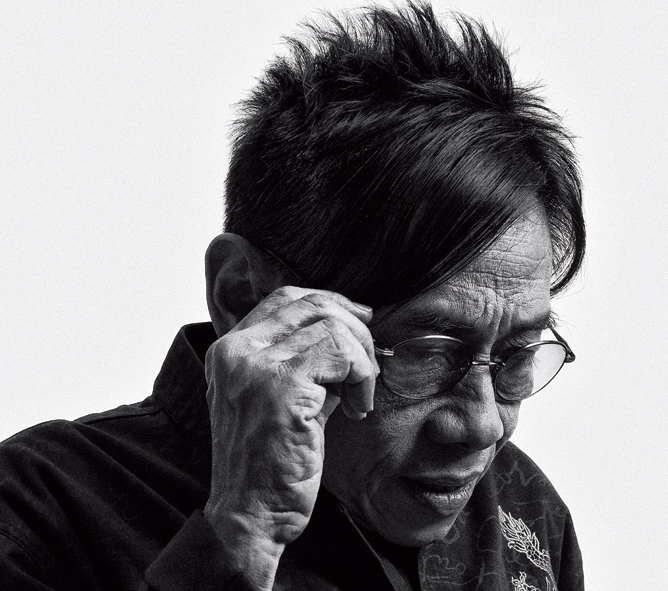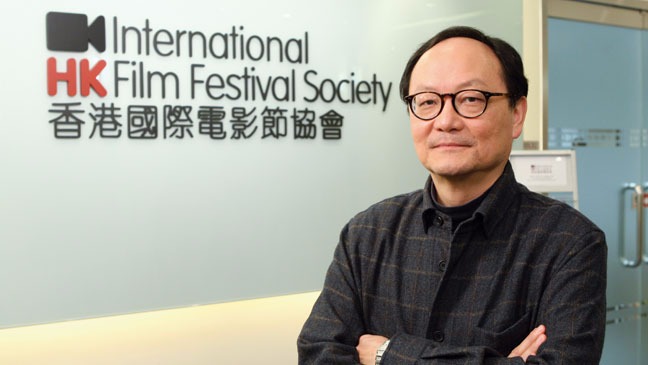DEREK KWOK CHI-KIN
 Derek Kwok Chi-Kin entered the film industry in 1993 and before he became a movie director he worked in the art direction department, wrote screenplays and directed music videos. He also was the assistant director on several films of the genre maestro Wilson Yip, including the action-loaded comic book adaptation Dragon Tiger Gate (2006). Following his own feature debut, the drama The Pye-Dog (2007), he continued his previous collaboration with co-screenwriter Clement Cheng with their crime drama The Moss (2008) and the breakthrough hit Gallants (2010), which mixes nostalgia for classic kung-fu films with humour and creative hyperbole. The success of this film launched Kwok into the directing big league and he got an offer to collaborate with Hong Kong’s biggest hit maker Stephen Chow on his spectacular comedy Journey To The West: Conquering The Demons (2013). Kwok followed this up with the star-studded fire-fighter action drama As the Light Goes Out (2014) and Full Strike (2015), another madcap variation on the martial arts ethos, this time applied to the world of badminton. His latest directing effort is Wu Kong (2017), a China-produced modern take on the popular Monkey King character.
Derek Kwok Chi-Kin entered the film industry in 1993 and before he became a movie director he worked in the art direction department, wrote screenplays and directed music videos. He also was the assistant director on several films of the genre maestro Wilson Yip, including the action-loaded comic book adaptation Dragon Tiger Gate (2006). Following his own feature debut, the drama The Pye-Dog (2007), he continued his previous collaboration with co-screenwriter Clement Cheng with their crime drama The Moss (2008) and the breakthrough hit Gallants (2010), which mixes nostalgia for classic kung-fu films with humour and creative hyperbole. The success of this film launched Kwok into the directing big league and he got an offer to collaborate with Hong Kong’s biggest hit maker Stephen Chow on his spectacular comedy Journey To The West: Conquering The Demons (2013). Kwok followed this up with the star-studded fire-fighter action drama As the Light Goes Out (2014) and Full Strike (2015), another madcap variation on the martial arts ethos, this time applied to the world of badminton. His latest directing effort is Wu Kong (2017), a China-produced modern take on the popular Monkey King character.
CLEMENT CHENG SI-KIT
 Clement Cheng Si-Kit started out as a script translator and art department assistant before he started directing commercials and music videos. He made his break as scriptwriter with his first produced script for the heroic bloodshed action drama A War Named Desire (2000), directed by Alan Mak of Infernal Affairs fame. The screenplay for the Wilson Yip directed action film Skyline Cruisers (2000) marks the first result of Cheng’s fruitful collaboration with fellow screenwriter and future director Derek Kwok. Together they made the crime drama The Moss (2008) and the crowd-pleasing festival hit Gallants (2010), which mixes nostalgia for classic kung-fu films with humour and creative hyperbole and where Cheng also collaborated as co-director. After that the creative duo parted ways, even though they occasionally continue to collaborate, as was the case with Kwok’s fire-fighter action drama As the Light Goes Out (2014), on which Cheng helped out as assistant director. Chang joined creative forces with Mak Yan-Yan, co-writing and co-directing the intimate drama Merry-Go-Round (2010) and she helped out as art director on his short film À Espera (2015). In recent years Cheng took up producing and is credited as producer on the action melodrama The Bodyguard (2016), staring and directed by the legendary Sammo Hung, and the zombie comedy Zombiology: Enjoy Yourself Tonight (2017).
Clement Cheng Si-Kit started out as a script translator and art department assistant before he started directing commercials and music videos. He made his break as scriptwriter with his first produced script for the heroic bloodshed action drama A War Named Desire (2000), directed by Alan Mak of Infernal Affairs fame. The screenplay for the Wilson Yip directed action film Skyline Cruisers (2000) marks the first result of Cheng’s fruitful collaboration with fellow screenwriter and future director Derek Kwok. Together they made the crime drama The Moss (2008) and the crowd-pleasing festival hit Gallants (2010), which mixes nostalgia for classic kung-fu films with humour and creative hyperbole and where Cheng also collaborated as co-director. After that the creative duo parted ways, even though they occasionally continue to collaborate, as was the case with Kwok’s fire-fighter action drama As the Light Goes Out (2014), on which Cheng helped out as assistant director. Chang joined creative forces with Mak Yan-Yan, co-writing and co-directing the intimate drama Merry-Go-Round (2010) and she helped out as art director on his short film À Espera (2015). In recent years Cheng took up producing and is credited as producer on the action melodrama The Bodyguard (2016), staring and directed by the legendary Sammo Hung, and the zombie comedy Zombiology: Enjoy Yourself Tonight (2017).
TEDDY ROBIN KWAN
 Teddy Robin Kwan with his band Teddy Robin and the Playboys became a sensation among the youth in the 60s, which also led to his first staring role in The Price of Love (1970). After several years of travelling adventures he returned to the film industry as producer and composer of Cops and Robbers (1979), which today is regarded as a milestone of Hong Kong cinema. His name features in the credits of some seminal New Wave films, like The Saviour (1980) or The Story of Woo Viet (1981). Tsui Hark approached Robin with an offer to score and star in his comedy All the Wrong Clues (1981), which was the beginning of Robin’s fruitful collaboration with Cinema City, the company which had a major part in bringing Hong Kong’s popular cinema into its modern age. Aside from staring in smaller parts and leading roles in several of the company’s films, he also worked there as composer, producer and eventually even director. He is the author of many cult soundtracks, including the iconic tunes of the box-office mega hit series Aces Go Places, 1982 – 1989) or the jazz score for Ringo Lam’s action thrillers City on Fire (1987) and Full Contact (1992). As a producer he mainly supported up-and-coming talents and he continued in the same vein even after leaving Cinema City. He produced films by such renowned filmmakers as Po-Chih Leong, Kirk Wong, Ronny Yu a Clara Law. His own directorial debut was the comedy All the Wrong Spies (1983), which he followed up with the big-budget adventure spectacle The Legend of Wisely (1987) and the star-studded martial arts drama Shanghai Shanghai (1990). His creative energy shows no sign of exhaustion even in the new millennia with him still continuing to act compose and produce. Only his directing efforts have moved towards more personal projects, as is the case with his latest film Lucid Dreams (2017).
Teddy Robin Kwan with his band Teddy Robin and the Playboys became a sensation among the youth in the 60s, which also led to his first staring role in The Price of Love (1970). After several years of travelling adventures he returned to the film industry as producer and composer of Cops and Robbers (1979), which today is regarded as a milestone of Hong Kong cinema. His name features in the credits of some seminal New Wave films, like The Saviour (1980) or The Story of Woo Viet (1981). Tsui Hark approached Robin with an offer to score and star in his comedy All the Wrong Clues (1981), which was the beginning of Robin’s fruitful collaboration with Cinema City, the company which had a major part in bringing Hong Kong’s popular cinema into its modern age. Aside from staring in smaller parts and leading roles in several of the company’s films, he also worked there as composer, producer and eventually even director. He is the author of many cult soundtracks, including the iconic tunes of the box-office mega hit series Aces Go Places, 1982 – 1989) or the jazz score for Ringo Lam’s action thrillers City on Fire (1987) and Full Contact (1992). As a producer he mainly supported up-and-coming talents and he continued in the same vein even after leaving Cinema City. He produced films by such renowned filmmakers as Po-Chih Leong, Kirk Wong, Ronny Yu a Clara Law. His own directorial debut was the comedy All the Wrong Spies (1983), which he followed up with the big-budget adventure spectacle The Legend of Wisely (1987) and the star-studded martial arts drama Shanghai Shanghai (1990). His creative energy shows no sign of exhaustion even in the new millennia with him still continuing to act compose and produce. Only his directing efforts have moved towards more personal projects, as is the case with his latest film Lucid Dreams (2017).
DANIEL YU WAI-KWOK
 Daniel Yu Wai-Kwok started out in the 80s in the script department at Golden Harvest, but soon he moved towards the production side of the industry. Collaborating with Andy Lau’s company Teamwork Motion Pictures, he featured as planner, producer, assistant director or co-director on several of the films staring the fabulously popular actor. Through Lau he also worked on Made in Hong Kong (1997) and The Longest Summer (1998), the first two parts of Fruit Chan’s handover trilogy, which reflected Hong Kong’s society at the time of the handover to China. Since the turn of the century Yu is alternating between projects in Hong Kong and China, producing mostly smaller but distinctively original projects mainly by up-and-coming filmmakers, who combine popular genres with local stories and critical reflections of society. This was also the idea behind the Focus First Cuts project, backed up by Andy Lau’s new production company and aiming to discover new talents in all the Chinese territories and diasporas in East Asia. To some extent Yu had his hand in all the films of the project, which among other spawned the Malay social drama Rain Dogs (2006), the Hong Kong melodrama My Mother Is a Belly Dancer (2006) or the audience hit Crazy Stone (2006), directed by the then brightest and most promising talent of Chinese cinema, Ning Hao. Among other Yu’s China-produced projects are One Night in Supermarket (2009), the debut feature by another distinctive Chinese director Yang Qing, the romantic comedy My Ex-Wife’s Wedding (2010) or Fruit Chan’s thriller Kill Time (2016). In Hong Kong Yu produced the intimate dramas At the End of Daybreak (2010), Happiness (2016) or Heaven in the Dark (2016).
Daniel Yu Wai-Kwok started out in the 80s in the script department at Golden Harvest, but soon he moved towards the production side of the industry. Collaborating with Andy Lau’s company Teamwork Motion Pictures, he featured as planner, producer, assistant director or co-director on several of the films staring the fabulously popular actor. Through Lau he also worked on Made in Hong Kong (1997) and The Longest Summer (1998), the first two parts of Fruit Chan’s handover trilogy, which reflected Hong Kong’s society at the time of the handover to China. Since the turn of the century Yu is alternating between projects in Hong Kong and China, producing mostly smaller but distinctively original projects mainly by up-and-coming filmmakers, who combine popular genres with local stories and critical reflections of society. This was also the idea behind the Focus First Cuts project, backed up by Andy Lau’s new production company and aiming to discover new talents in all the Chinese territories and diasporas in East Asia. To some extent Yu had his hand in all the films of the project, which among other spawned the Malay social drama Rain Dogs (2006), the Hong Kong melodrama My Mother Is a Belly Dancer (2006) or the audience hit Crazy Stone (2006), directed by the then brightest and most promising talent of Chinese cinema, Ning Hao. Among other Yu’s China-produced projects are One Night in Supermarket (2009), the debut feature by another distinctive Chinese director Yang Qing, the romantic comedy My Ex-Wife’s Wedding (2010) or Fruit Chan’s thriller Kill Time (2016). In Hong Kong Yu produced the intimate dramas At the End of Daybreak (2010), Happiness (2016) or Heaven in the Dark (2016).
ROGER GARCIA
 Roger Garcia discovered his love for cinema during his studies on a sixth form college in England, where he ran the film society and discovered the classics of European and American cinema. He studied art and cinema at the university in Leeds and at that time he also started writing about film. According to his own words, he started to discover Hong Kong’s cinema only after returning to his place of birth in the late 70s. There he got a job at the Urban Services Department, which at that time was starting to develop its cultural initiatives, including the Hong Kong International Film Festival. Garcia, who was simultaneously working as a film critic, was collaborating on the formative editions of the festival, steered it towards systematic retrospectives of local cinema and also had his hand in pioneering the festival’s line of bilingual film related publications, which to this day remain an invaluable source of information regarding Hong Kong cinema. During the 90’s Garcia produced several films in America, ranging from studio features to indie projects. Since the turn of the century he is again regularly focusing on film criticism and his articles appear among other in international magazines like Variety, Cahiers du Cinema or Film Comment. He also had lectures on Asian cinema at Stanford University and University of California, Berkeley. As a consulter and curator he works with several international film festivals including the Far East Film Festival in Udine. In 2010 he became the executive director of The Hong Kong International Film Festival Society, which aside from the eponymous festival also organises the Asian Film Awards and the Hong Kong-Asia Film Financing Forum.
Roger Garcia discovered his love for cinema during his studies on a sixth form college in England, where he ran the film society and discovered the classics of European and American cinema. He studied art and cinema at the university in Leeds and at that time he also started writing about film. According to his own words, he started to discover Hong Kong’s cinema only after returning to his place of birth in the late 70s. There he got a job at the Urban Services Department, which at that time was starting to develop its cultural initiatives, including the Hong Kong International Film Festival. Garcia, who was simultaneously working as a film critic, was collaborating on the formative editions of the festival, steered it towards systematic retrospectives of local cinema and also had his hand in pioneering the festival’s line of bilingual film related publications, which to this day remain an invaluable source of information regarding Hong Kong cinema. During the 90’s Garcia produced several films in America, ranging from studio features to indie projects. Since the turn of the century he is again regularly focusing on film criticism and his articles appear among other in international magazines like Variety, Cahiers du Cinema or Film Comment. He also had lectures on Asian cinema at Stanford University and University of California, Berkeley. As a consulter and curator he works with several international film festivals including the Far East Film Festival in Udine. In 2010 he became the executive director of The Hong Kong International Film Festival Society, which aside from the eponymous festival also organises the Asian Film Awards and the Hong Kong-Asia Film Financing Forum.